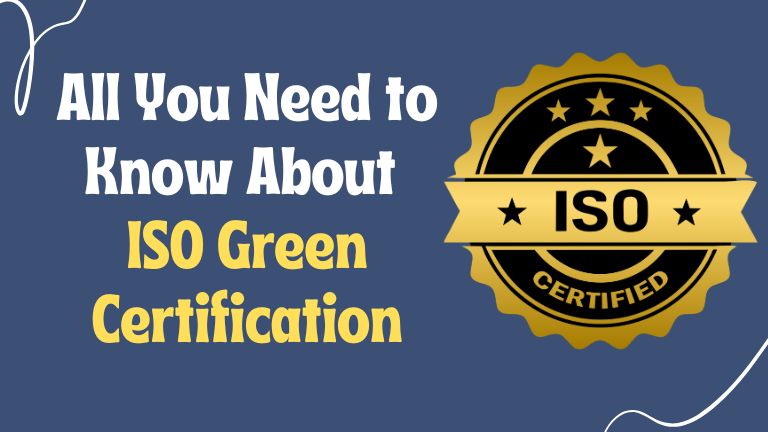In an era where environmental concerns dominate global discussions,
businesses are under increasing pressure to adopt sustainable practices. ISO
Green Certification has emerged as a significant milestone for organizations
committed to environmental responsibility and sustainability. This
certification not only enhances a company’s reputation but also underscores its
dedication to minimizing its ecological footprint.
What is ISO Green Certification?
ISO Green Certification refers to standards set by the International
Organization for Standardization (ISO) that focus on environmental management
and sustainability. The most notable among these is ISO 14001, which provides a
framework for organizations to develop an effective Environmental Management
System (EMS). This certification helps businesses identify, manage, monitor,
and control their environmental issues in a holistic manner.
Why is ISO Green Certification Important?
- Environmental
Responsibility: Achieving ISO Green Certification
demonstrates a company's commitment to reducing environmental harm,
conserving resources, and promoting sustainable practices.
- Regulatory
Compliance: Many governments have stringent environmental regulations. ISO
14001 ensures that businesses remain compliant, reducing the risk of fines
or legal actions.
- Market
Competitiveness: In a marketplace where consumers are
increasingly eco-conscious, businesses with ISO Green Certification gain a
competitive edge.
- Cost
Savings: By optimizing resource use and minimizing waste, companies can
significantly cut operational costs.
- Stakeholder
Trust: Investors, clients, and partners are more likely to engage with
organizations that prioritize sustainability and ethical practices.
Key Features of ISO 14001 Certification
- Leadership
Commitment: The certification requires active participation from top
management to embed environmental considerations into organizational
strategies.
- Risk
and Opportunity Assessment: Organizations must evaluate environmental
risks and opportunities, ensuring they are proactive in mitigating
negative impacts.
- Life
Cycle Perspective: Businesses are encouraged to consider the
environmental impact of their products and services throughout their life
cycle.
- Continuous
Improvement: ISO 14001 emphasizes ongoing efforts to enhance environmental
performance.
- Integration
with Business Processes: The certification ensures that environmental
management is integrated into core business operations.
Steps to Achieve ISO Green Certification
- Gap
Analysis: Conduct a thorough review of your current practices against ISO
14001 requirements to identify areas of improvement.
- Develop
an Environmental Management System (EMS): Create a structured system
to manage environmental impacts, set objectives, and measure performance.
- Employee
Training and Awareness: Educate employees about the importance of
environmental sustainability and their role in achieving it.
- Internal
Audit: Perform internal audits to ensure your EMS aligns with ISO
standards.
- Third-Party
Audit: Engage a certified body to evaluate your EMS and recommend
certification.
- Certification
and Maintenance: Once certified, continuously monitor and
improve your practices to retain the certification.
Benefits of ISO Green Certification
- Enhanced
Reputation: Being ISO certified signals to stakeholders that your
organization is environmentally responsible.
- Operational
Efficiency: Streamlined processes reduce waste and inefficiencies, leading to
better resource utilization.
- Risk
Mitigation: Proactively addressing environmental risks minimizes potential
liabilities.
- Customer
Satisfaction: Eco-conscious customers are more likely to support businesses
that prioritize sustainability.
- Global
Recognition: ISO certifications are internationally recognized, making it
easier to compete in global markets.
Real-World Examples of ISO Green Certification
Impact
- Manufacturing
Sector: A leading automotive company adopted ISO 14001, resulting in a
20% reduction in waste and a significant decrease in energy consumption.
- Retail
Industry: A global retail chain integrated ISO standards into its
operations, enhancing supply chain transparency and reducing packaging
waste.
- Hospitality: A
luxury hotel chain achieved ISO Green Certification, leading to improved
energy management and water conservation practices.
Challenges in Achieving ISO Green Certification
While the benefits are substantial, organizations often face challenges
such as:
- Initial
Costs: Implementing an EMS and undergoing audits require financial
investment.
- Cultural
Resistance: Employees may be resistant to changes in established workflows.
- Complex
Regulations: Navigating local and international environmental laws can be
daunting.
- Ongoing
Commitment: Maintaining certification demands continuous effort and resource
allocation.
How to Overcome These Challenges
- Leadership
Buy-In: Secure commitment from top management to drive the initiative.
- Effective
Communication: Highlight the long-term benefits of certification to employees
and stakeholders.
- Engage
Experts: Work with consultants or certification bodies to simplify the
process.
- Leverage
Technology: Utilize tools and software to monitor environmental performance
and ensure compliance.
Future Trends in ISO Green Certification
- Integration
with Digital Tools: As technology advances, organizations are
leveraging AI and IoT to monitor environmental metrics in real-time.
- Focus
on Carbon Neutrality: Businesses are increasingly aligning their
EMS with global goals for carbon reduction and climate action.
- Sector-Specific
Standards: ISO is developing tailored guidelines for industries with unique
environmental challenges.
- Enhanced
Stakeholder Involvement: There’s a growing emphasis on involving
communities and stakeholders in environmental initiatives.
Conclusion
ISO Green Certification is more than just a badge of honor; it is a
roadmap to a sustainable future. By aligning business operations with
environmental standards, organizations can drive meaningful change while
reaping tangible benefits. As the world moves towards greener practices,
obtaining ISO Green Certification is not just a competitive advantage but a
necessity for businesses aspiring to thrive in a sustainable global economy.

